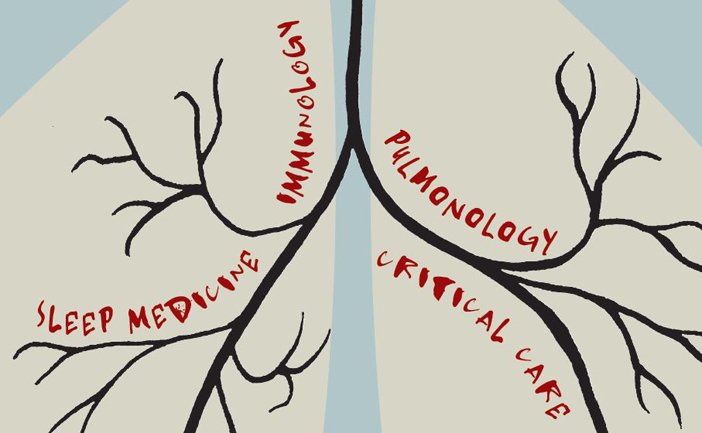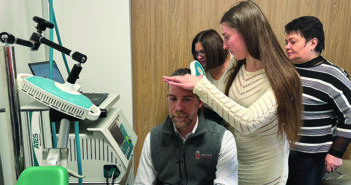Sleep Study
“The strength of Brown is that it fosters collaboration,” says Richard Millman, MD, professor of medicine and pediatrics. “What Jack [Elias] has done [with BIRDs]has seized on that.” Millman is particularly enthusiastic about Elias’s focus on translational research and collaboration. “He’s really been pushing the bench-to-clinical thread,” Millman says. “I think he’s becoming the glue—he’s pulling it together.” And BIRDs has reunited Millman and Elias, who studied and worked together as med students, fellows, and junior faculty at the University of Pennsylvania.
During his fellowship, in the early 1980s, Millman was a pioneer in the mysterious field of sleep research. “We had a fledgling sleep lab where we did one study every two months in people who were near death,” he says. “An attending or a fellow had to spend the night in the lab with the sleep tech because they thought the patient would die.”
These patients had Pickwickian syndrome— named for a character in Charles Dickens’s novel The Pickwick Papers and now often called obesity hypoventilation syndrome, in which severely overweight patients fail to breathe deeply enough during the day and often stop breathing for short periods during sleep. Brown recruited Millman in 1985 to start a clinical sleep lab, and the research has ramped up since then. At its peak, the Brown clinical sleep lab was doing up to 15 studies a night. Now many studies are done in patients’ homes.
Sleep problems affect people of all ages, and Millman has researched the whole range. He studied sleep in the elderly while at Penn and now spends 30 percent of his time working with pediatric patients at Hasbro Children’s Hospital, where he has seen overweight children with severe sleep apnea.
Sleep apnea, in which the throat closes off during sleep, ties Millman’s clinical and research work together and is the reason why he is a part of BIRDs. When people fall asleep the muscles in their throats relax, narrowing the throat opening. In a person with sleep apnea, inhaling creates a vacuum that is strong enough to suck the throat closed. “It’s like vacuuming with a vacuum cleaner and getting a rug stuck in the vacuum cleaner,” Millman says. Untreated sleep apnea can create a host of complications, including high blood pressure and heart problems.
The most common treatment for sleep apnea is positive pressure therapy with a CPAP (continuous positive airway pressure) machine. Millman is working with Katherine Sharkey, MD, PhD, assistant professor of medicine, on a BIRDs-inspired project to see whether people with untreated sleep apnea express inflammatory markers identified by the Elias lab. They will test whether these markers go away after positive pressure therapy.
Millman also has embarked on a much larger project: he is studying 150 patients with end-stage chronic kidney disease before they go on dialysis. “In this group there is a high incidence of cardiovascular morbidity and mortality,” he says. “Our premise is that bad stuff happens at night, and this is probably affecting these chronic renal failure patients and increasing their risk of heart problems.”
The collaborative project—which involves kidney specialists Katherine Richman, MD, and Lance Dworkin, MD, as well as Samuel Dudley, MD, the Ruth and Paul Levinger Professor of Cardiology— was funded by a large anonymous gift to Brown. The patients will undergo intense monitoring. Each will be checked for sleep apnea and will have 24-hour blood pressure monitoring and “some really fancy monitoring of vasoconstriction— how the vessels in the fingers are constricting,” Millman says. Dudley’s lab will also measure markers of sudden death and cardiac decay in blood samples from the patients, and the Elias group will look at markers of inflammation.
“This is the largest organized study that’s been done in this population,” Millman says. The researchers hope this massive collection of data will show if there is a link between “bad stuff” happening at night, like sleep apnea or an increase in blood pressure, and heart problems in these very sick kidney patients.




